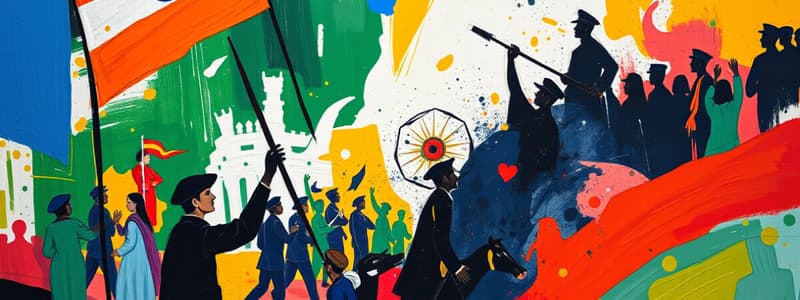Podcast
Questions and Answers
What was the primary purpose of the Government of India Act of 1935?
What was the primary purpose of the Government of India Act of 1935?
- To establish British control over India permanently
- To grant full independence to India
- To allow provinces to hold elections and form governments (correct)
- To abolish the British monarchy in India
What percentage of the population was granted the right to vote for the provincial assemblies under the Government of India Act of 1935?
What percentage of the population was granted the right to vote for the provincial assemblies under the Government of India Act of 1935?
- 50%
- 1%
- 25%
- 12% (correct)
How many provinces had a Congress Prime Minister after the elections in 1937?
How many provinces had a Congress Prime Minister after the elections in 1937?
- 5 out of 11
- 8 out of 11 (correct)
- 3 out of 11
- 10 out of 11
Which major world event influenced the political situation in India between 1939 and 1942?
Which major world event influenced the political situation in India between 1939 and 1942?
What natural obligation did Britain impose regarding India's participation in World War II?
What natural obligation did Britain impose regarding India's participation in World War II?
What internal conflict did Congress face regarding the Second World War?
What internal conflict did Congress face regarding the Second World War?
What was one of the concerns for Indians regarding their support for the British during the war?
What was one of the concerns for Indians regarding their support for the British during the war?
In the context of the political landscape in India, what was a major question the Congress leaders faced during World War II?
In the context of the political landscape in India, what was a major question the Congress leaders faced during World War II?
What was the primary concern of Congress leaders regarding Britain during the fascist threat?
What was the primary concern of Congress leaders regarding Britain during the fascist threat?
What ideology did Congress leaders oppose during the rise of fascism?
What ideology did Congress leaders oppose during the rise of fascism?
How did M.K. Gandhi refer to Adolf Hitler in his letter?
How did M.K. Gandhi refer to Adolf Hitler in his letter?
What was Winston Churchill's political affiliation during the war?
What was Winston Churchill's political affiliation during the war?
What position did the Labour Party take in comparison to the Conservatives regarding Indian freedom?
What position did the Labour Party take in comparison to the Conservatives regarding Indian freedom?
Which tactic did Gandhi state he had deliberately avoided while addressing Hitler?
Which tactic did Gandhi state he had deliberately avoided while addressing Hitler?
What was the main argument Gandhi presented in his letter to Hitler?
What was the main argument Gandhi presented in his letter to Hitler?
What did the British government realize about their stance on India during the fascist conflict?
What did the British government realize about their stance on India during the fascist conflict?
Flashcards are hidden until you start studying
Study Notes
Final Phase of National Movement
- The last phase of the National Movement involved significant questions leading to India's partition.
- Complicated dynamics arose between supporting Britain in WWII and the pursuit of independence.
India During World War II (1939-42)
- WWII began in 1939 while India was largely governed by Congress ministries.
- The Government of India Act, passed in 1935, allowed partial self-governance, with limited voting rights (12% provincial assemblies, 1% Central assembly).
- Congress won elections in eight out of 11 provinces in 1937, forming local governments under British supervision.
Dilemma of War Support
- The British announced India would participate in WWII without consulting Indian leaders.
- Congress leaders debated the merits of aiding Britain against Axis powers and prioritizing India's own freedom struggle.
- The rise of Fascism, especially under Hitler, posed moral dilemmas regarding support for the war.
Divisions within Congress
- Most Congress leaders opposed Fascism and the totalitarian regimes in Europe, correlating this with India's own fight for freedom.
- The expectation was that Britain would recognize their reliance on Indian support while denying full independence.
British Political Context
- At the time, Britain was under an all-party government led by Prime Minister Winston Churchill (Conservative).
- Conservatives aimed to retain the British Empire, while the Labour Party was more supportive of Indian independence.
Gandhi's Letter to Hitler
- Mahatma Gandhi penned a letter to Hitler in a personal plea for peace, expressing concern over the potential devastation of war.
- He declined to participate in war and sought a resolution through non-violent means.
Political Landscape in India
- The complexities of the political situation illustrated the struggle between imperial interests and rising demands for self-rule.
- The approach towards supporting the war reflected broader tensions within India's nationalist movements and British colonial policies.
Studying That Suits You
Use AI to generate personalized quizzes and flashcards to suit your learning preferences.




